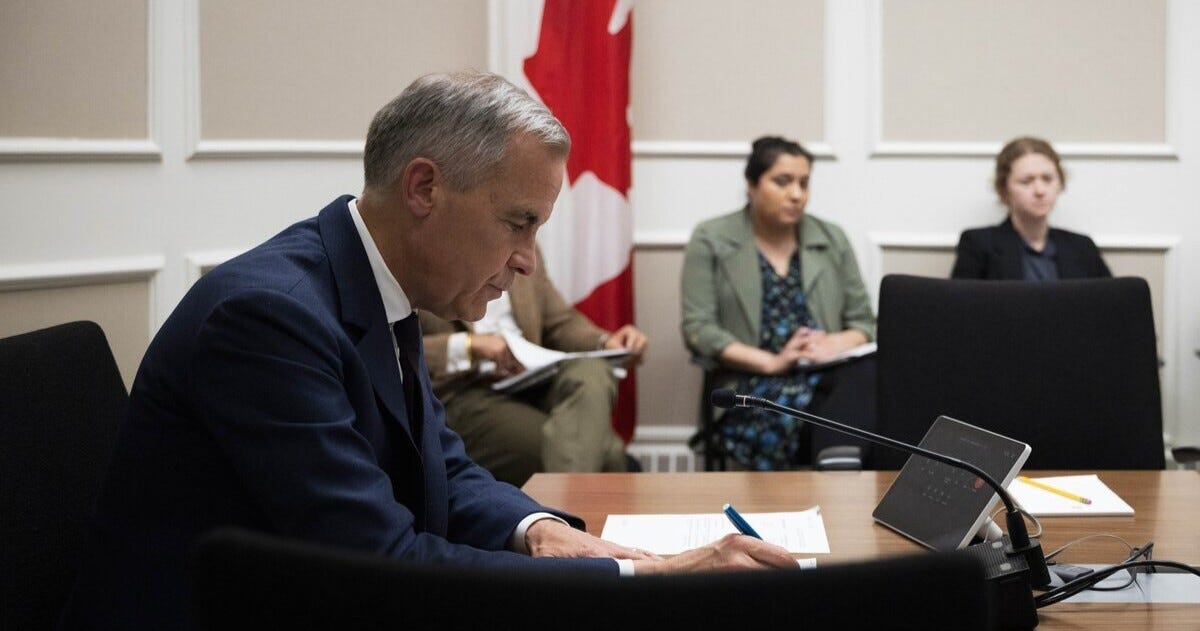Constitutional lawyers say new border bill lets gov spy on your social media
A prominent constitutional rights group is pushing back against the Carney government’s new border security bill, arguing that it would grant authorities sweeping new powers over Canadians’ privacy.
A prominent constitutional rights group is pushing back against the Carney government’s new border security bill, arguing that it would grant authorities sweeping new powers over Canadians’ privacy.
The Canadian Constitution Foundation expressed its concerns about Bill C-2 granting authorities “new powers that undermine privacy, due process, and trust in our democratic institutions.”
The proposed border security legislation tabled on Tuesday would allow authorities to intercept communications and access information without a court-approved warrant.
Its stated goals are to secure the border, combat organized crime, crack down on fentanyl smuggling and bolster the authorities’ ability to fight against financial crimes.
“While Bill C-2 addresses some serious concerns — from fentanyl trafficking to abuse of Canada’s asylum system — there are several provisions that raise serious constitutional and civil liberties questions,” Joanna Baron, executive director for the CCF told True North.
“One of the most concerning is the proposed change to the Canada Post Act, which would allow customs officers to open letter mail — something that has long been considered especially private.”
It’s not just mail.
The legislation would also “allow a justice or judge to authorize, in a warrant, a peace officer or public officer to make a request to a foreign entity that provides telecommunications services to the public to produce transmission data or subscriber information that is in its possession or control.”
In other words, the government could have warrantless access to the social media communications of Canadians.
Baron said that the legislation is a “direct challenge” to Canadians’ Section 8 Charter rights against unreasonable search and seizure because it “lacks any safeguards to prevent officers from reading the content of personal correspondence.”
Additionally, Bill C-2 aims to set new limits on cash transactions over $10,000 to curtail money laundering, something Baron called a “major red flag.”
“This may be framed as a tool against money laundering, but it raises serious concerns about financial surveillance and the creeping criminalization of privacy-preserving behaviour,” she said.
“Canadians should be able to use their own money without automatically being treated as suspects.”
The legislation also intends to implement a new Act that would force nearly every organization offering “electronic services” to organize its users’ data in such a way that it can be easily accessed by law enforcement or intelligence agencies when required and approved.
Baron noted that granting the government the ability to engage in “warrantless sharing of personal financial information between police, government departments, and banks under anti-money laundering laws” is “perhaps the most troubling provision” included in the bill.
“This echoes what we saw during the Emergencies Act invocation, when peaceful protestors had their accounts frozen without due process,” said Baron. “Given that recent history, Canadians are right to be wary of expanded surveillance powers — especially when definitions of ‘terrorist’ or ‘criminal’ are increasingly politicized.”
While the CCF understands the need for the government to respond to increasing border security concerns, it recommends granting authorities new powers with “extreme caution.”
“We must be extremely cautious about granting new powers that undermine privacy, due process, and trust in our democratic institutions,” said Baron. “Bill C-2 deserves far more public debate before being passed into law.”





A classic "problem-reaction-solution" strategy. Fling open the borders to unlimited "refugees"; import hundreds of thousands of unvetted economic migrants from global criminal hot-spots; allow fentanyl precursors to flood in from China and ignore the proliferation of manufacturing labs; promote the squalid urban addict lifestyle while coddling gangs and organized crime. Then when society starts to collapse and everyone is frightened, activate the surveillance/security apparatus to "keep us safe".
“In other words, the government could have warrantless access to the social media communications of Canadians”
Further evidence of a communist country lead by toxic dictators.